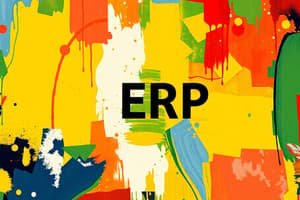Podcast
Questions and Answers
What is the purpose of ERP modules in an organization?
What is the purpose of ERP modules in an organization?
- To provide entertainment for employees
- To handle external communication
- To manage an organization's core business processes (correct)
- To increase office supplies
Which module in an ERP system manages accounts payable and financial reporting?
Which module in an ERP system manages accounts payable and financial reporting?
- Human Capital Management
- Supply Chain Management
- Financial Management (correct)
- Customer Relationship Management
Which module in an ERP system focuses on managing inventory, purchasing, and order fulfillment?
Which module in an ERP system focuses on managing inventory, purchasing, and order fulfillment?
- Quality Management
- Distribution
- Project and Service Management
- Supply Chain Management (correct)
What does the Human Capital Management module in an ERP system primarily manage?
What does the Human Capital Management module in an ERP system primarily manage?
Which module in an ERP system deals with managing customer interactions, sales, and marketing activities?
Which module in an ERP system deals with managing customer interactions, sales, and marketing activities?
Which ERP module is responsible for managing production planning, scheduling, and material requirements planning for manufacturers?
Which ERP module is responsible for managing production planning, scheduling, and material requirements planning for manufacturers?
What is the primary purpose of mnemonic devices in learning?
What is the primary purpose of mnemonic devices in learning?
Which memory technique involves connecting new information to existing knowledge or experiences?
Which memory technique involves connecting new information to existing knowledge or experiences?
What strategy involves switching between various topics to improve long-term retention and transfer of learning?
What strategy involves switching between various topics to improve long-term retention and transfer of learning?
How can repetition aid in memory improvement?
How can repetition aid in memory improvement?
Which learning style primarily benefits from physical demonstrations and hands-on activities?
Which learning style primarily benefits from physical demonstrations and hands-on activities?
What role does active recall play in enhancing learning?
What role does active recall play in enhancing learning?
Which concept refers to the process of selectively focusing on relevant information and filtering out irrelevant stimuli?
Which concept refers to the process of selectively focusing on relevant information and filtering out irrelevant stimuli?
How do effective study strategies impact information retention?
How do effective study strategies impact information retention?
What does self-explanation involve that can deepen understanding and improve long-term retention?
What does self-explanation involve that can deepen understanding and improve long-term retention?
In the context of learning, what is the main objective of cognitive psychology?
In the context of learning, what is the main objective of cognitive psychology?
Which process involves converting sensory inputs into a mental representation?
Which process involves converting sensory inputs into a mental representation?
How can understanding learning styles benefit the learning process?
How can understanding learning styles benefit the learning process?
Flashcards are hidden until you start studying
Study Notes
ERP Modules: The Heart of Enterprise Resource Planning
Enterprise Resource Planning (ERP) systems are comprehensive, interconnected software applications designed to manage an organization's core business processes. ERP systems are structured around functional modules, which address specific needs within an organization's operations.
These modules streamline and integrate data across the organization, providing a holistic, real-time view of company performance. Here are some key functional modules found in most ERP systems:
Financial Management
Manages accounts payable, accounts receivable, general ledger, and financial reporting.
Supply Chain Management
Manages inventory, purchasing, and order fulfillment.
Human Capital Management
Manages employee data, payroll, and benefits.
Customer Relationship Management
Manages customer interactions, sales, and marketing activities.
Project and Service Management
Manages project planning, budgeting, and resource allocation for services-based industries.
Manufacturing
Manages production planning, scheduling, and material requirements planning for manufacturers.
Distribution
Manages the flow of products through warehouses and distribution centers.
Procurement
Manages the purchasing of goods or services from external suppliers.
Quality Management
Manages quality control, audits, and compliance.
Warehouse Management
Manages inventory, pick-and-pack operations, and stock control within warehouses.
Business Intelligence and Analytics
Uncovers insights from ERP data, supporting data-driven decision-making.
ERP systems are highly customizable, with many vendors offering a wide range of specialized modules to address industry-specific needs. For example, modules for the healthcare industry might include patient management, laboratory information management, and clinical workflow management.
Successful ERP implementations require careful planning and consideration of the organization's unique needs. Choosing the right ERP system and modules is a critical step in this process, as it sets the foundation for a streamlined, efficient, and effective operation.
Studying That Suits You
Use AI to generate personalized quizzes and flashcards to suit your learning preferences.




